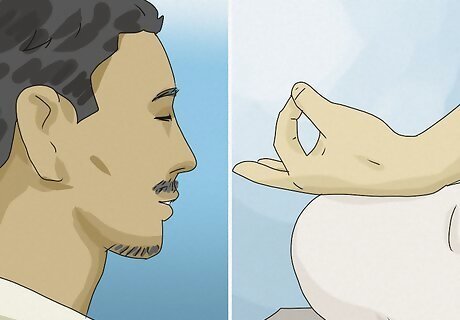
views
X
Research source
It is an ancient word, generally referring to the “universal order” of action and reaction. The concept of karma is used by different religions and spiritualities, including Hinduism and Buddhism. It can reflect how a person’s past actions shape them.[2]
X
Research source
If you feel like you have bad karma, you may try a few actions to help balance your karma.

Be charitable. Mahatma Gandhi famously said: “The best way to find yourself is to lose yourself in the service of others.” You can reverse bad karma by practicing positive actions. This may include: Donating your time to a cause that you believe in (i.e. volunteering at an animal shelter or a soup kitchen) Giving money to a cause you believe in (i.e. American Diabetes Foundation) Giving more compliments Doing kind favors for someone (i.e. Making a dinner for a loved one or doing home repairs for an elderly neighbors.)

Apologize. If you know you have done something wrong, or offended someone, you should directly apologize. Be sincere about your mistakes and what you have learned from them. This will help put you on the right track for good karma. Try some of the following conversations: ”I am very sorry about what I said about your cooking last week; I did not mean to hurt your feelings. Can you please forgive me?” ”I am sorry for not calling you last week. Why don’t we get coffee on Friday?” ”I am truly sorry for my actions yesterday. I can understand why you were mad at me.I will never do anything like that again .” ”I didn’t mean what I said last week. I’m sorry I was in such a bad mood. Can you forgive me?”

Break the routine. If you have identified the actions that have led you to bad karma, realize it is time for you to change your actions. If you find yourself being negative toward a specific person or people, resolve to start a conversation with a compliment next time. Develop this as a new positive habit. If you find yourself being selfish, resolve to do a charitable action each day even if it is a small one. Try something small like holding a door open for someone. Practice this to develop a new routine of positive actions.

Stay positive. Life is difficult and frustrating events happen. Thinking positive may not reverse bad events, but it can help you better cope with stress in your life. Try and reflect on the positive things in life to help you reverse bad karma by seeing the good and kindness in life. Take a moment to enjoy the weather. If the weather is nice, reflect that not every day will be like this. Give thanks to your good health. Enjoy a meal. Sometimes we eat without thinking; take a few moments to savor a well-prepared dish.

Take responsibility for your own actions. As “karma” means action, you must be accountable for the actions that you take. Try to: Stop blaming others. This is a bad habit. Really consider the action and try and move on from it. Blaming others only slows down this process. Practice self-focusing. Worrying about the future will not help you in the present. Focus on the daily tasks that you can control to live a more positive life. Be accountable. You are the only one responsible for your actions. If, for example, you are in an argument with a loved one, you can control how you respond. Focus on how you respond.

Be mindful. Buddha writes: “Mind precedes all mental states.” This means that you must reflect on your own actions and how they affect other actions around you. Like practicing self-focusing, you should be mindful of your actions and decisions. They reflect on how others respond to you.

Be kind. There is an old adage of: “treat others like you want to be treated.” This golden rule can help to reverse bad karma by promoting goodness and kindness. Give compliments to people such as: “What you said about [x] was really intelligent.” or “This dinner is really good. Thanks for cooking for me!”

Practice chanting a mantra. Language can be a powerful tool. To create a positive mindset, you can practice a chant or mantra. Try practicing a self-affirmation in front of a mirror on a daily basis. You can say something like: “I will be a more positive person today” or “I will complain less about my problems.” This will help build up your self-confidence and develop a positive routine. Chant a mantra related to your spiritualism. For example, Catholicism repeats words on a rosary. Nianfo (mindful repetition/recollection of the name of Amitābha Buddha) is an Eastern Asian Buddhist act . Whatever your religion or spirituality is, find if there is a chant or mantra that you can use to feel closer to your faith.

Write down your transgressions. If you feel you have bad karma but are not sure of the direct reasons, a good place to start is to write down what you feel you have done wrong. Think about a specific time in the past, like a day or a week, and list out what you’ve done that may have given you negative karma. This will give you a good starting point on how you can repair your negative karma. Think about: Did you offend someone by your words? Did you offend someone by your actions? Did you neglect or forget to do something you were supposed to? Did you lie or cheat about something? Did you break a set rule or law? Have you been selfish or neglectful?

Reflect or meditate. You may know what you have done to receive bad karma. However, you must also understand why your actions negatively impacted you and those around you. To do this, you can meditate or reflect on your actions. This is also important to help you realize why do you keep repeating the same patterns. There are different meditation techniques: Breathing meditations—This type of meditation focuses on controlling your breathing.This will calm your mind and promote inner peace. In a quiet place, sit in a comfortable position. Partially close your eyes and focus on your breathing. Become aware of the sensation of breathing in through your nose and out through your mouth. Practice this movement until your mind starts to clear and you begin to relax. Transforming meditations—This type of meditation is designed to bring peacefulness to your mind by training your body not to worry about mental or physical discomforts. This type of meditation is done by studying and considering the philosophy that drives your morality. You can do this by: reading the works of your religions or religious figures, reading the works of philosophers, or studying science and the construction of the universe. Loving kindness meditations—This type of meditation is practiced in four steps: preparation, contemplation, meditation, and dedication. The first step requires you to prepare for meditation by sitting in a comfortable position and breathe deeply. The contemplation stage requires you to think about how all life should be cherished and that happiness comes from your kind actions. Meditation allows you to come up with concrete ways to practice kind actions such as: “I will cherish each day that I am given” or “I will be kinder to myself and others.” Dedication is living up to those promises made in the meditation stage.




















Comments
0 comment